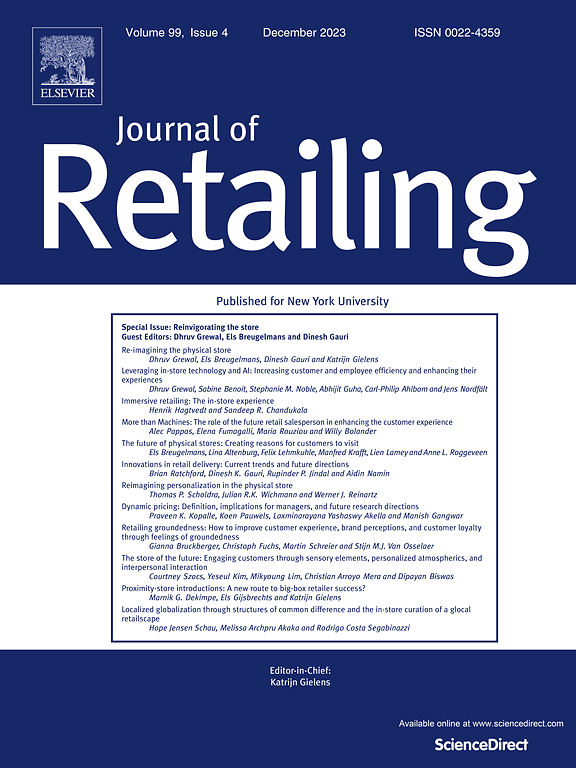Navigating online order fulfillment failures: Impacts on future customer behavior and the role of retailer mitigation
IF 10.2
1区 管理学
Q1 BUSINESS
引用次数: 0
Abstract
In online grocery retail, out-of-stocks can cause order fulfillment failures. Store-based fulfillment models have heightened this challenge. Here, online customers often receive orders not fulfilled as expected, with products being substituted, partially fulfilled, or reimbursed. When order fulfillment fails, the customer may change future ordering behavior by delaying the next order or by spending less in the online channel. Using data from the online operation of a leading omnichannel grocery retailer, we evaluate the magnitude of impact on the next order when the prior one is not fulfilled as expected. We also explore the role of retailer efforts in mitigating this impact. We find that failures significantly delay the time to the next order by 7.22% on average, with delays becoming more pronounced for non-perishable products. Spending reductions are especially evident when promoted items fail to ship. Mitigation efforts, substitutions in particular, often exacerbate delays and compound the dissatisfaction. Although substitutions help recover lost sales, they negatively impact future customer behavior. This suggests that selective stockout prevention, coupled with improved substitution practices, should be prioritized to optimize economic and customer outcomes.
导航在线订单履行失败:对未来客户行为的影响和零售商缓解的作用
在网上杂货零售中,缺货会导致订单履行失败。基于商店的履行模式加剧了这一挑战。在这里,在线客户经常收到未按预期完成的订单,产品被替换、部分完成或退款。当订单履行失败时,客户可能会通过延迟下一个订单或减少在线渠道的支出来改变未来的订购行为。利用一家领先的全渠道杂货零售商的在线运营数据,我们评估了当前一个订单未按预期完成时对下一个订单的影响程度。我们还探讨了零售商在减轻这种影响方面的作用。我们发现,失败会显著延迟下一个订单的时间,平均延迟7.22%,对于不易腐烂的产品,延迟变得更加明显。当促销商品无法发货时,支出减少尤为明显。缓解措施,特别是替代措施,往往会加剧延误,加剧不满情绪。虽然替代有助于恢复失去的销售,但它们会对未来的客户行为产生负面影响。这表明,应优先考虑选择性预防缺货,并辅以改进的替代做法,以优化经济和客户结果。
本文章由计算机程序翻译,如有差异,请以英文原文为准。
求助全文
约1分钟内获得全文
求助全文
来源期刊

Journal of Retailing
BUSINESS-
CiteScore
15.90
自引率
6.00%
发文量
54
审稿时长
67 days
期刊介绍:
The focus of The Journal of Retailing is to advance knowledge and its practical application in the field of retailing. This includes various aspects such as retail management, evolution, and current theories. The journal covers both products and services in retail, supply chains and distribution channels that serve retailers, relationships between retailers and supply chain members, and direct marketing as well as emerging electronic markets for households. Articles published in the journal may take an economic or behavioral approach, but all are based on rigorous analysis and a deep understanding of relevant theories and existing literature. Empirical research follows the scientific method, employing modern sampling procedures and statistical analysis.
 求助内容:
求助内容: 应助结果提醒方式:
应助结果提醒方式:


